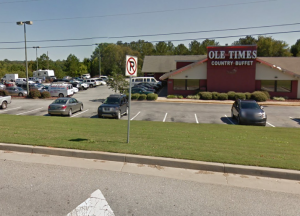
(Google Maps)
Security Lapse? Our Legal Take: Woman Shot, Robbed Outside Old Times Buffet
Local News
A 64-year-old employee of the Old Times Buffet was reportedly “robbed and shot…as she walked to her car” outside the restaurant in Macon Sunday, December 27, 2015.
According to Athens Banner-Herald, the victim was assaulted by two men outside the Old Times Buffet. The assailants apparently stole the victims apron, containing money and personal items, before shooting her in the abdomen.
Police are still searching for suspects.
Our Legal Take
Restaurant patrons and employees have a right to feel safe and secure while on property. The Murray Law Firm questions whether this shooting may have been prevented and the level of security provided to patrons of the parking lot where this incident took place.
- What parking lot security measures, such as bright lighting, surveillance cameras and security patrols, were in place to protect patrons and employees at the time of the shooting?
- Have there been previous incidents of violence in the area and, if so, were any additional security measures implemented by the restaurant owner to deter future crime?
By law, property owners are required to protect all patrons legally on property and to provide a safe work environment to employees. Should the facts of this matter reveal that the restaurant owner or management failed to provide adequate security, the victim may elect to seek justice and pursue a legal claim for her injuries.
Based upon its extensive and successful experience in handling workers’ compensation and negligent security cases in Georgia, The Murray Law Firm suggests that photographs and a thorough, unbiased inspection of the property will need to be performed immediately, before any evidence may be repaired, damaged or destroyed.
We Fight for Victims of Security Negligence in Georgia…Contact us Now for a Free Consultation.
 The Murray Law Firm has recovered millions of dollars for victims of unsafe properties in Georgia, and recently obtained a $29.25 million dollar verdict for one of our Georgia Clients in Fulton County State Court.
The Murray Law Firm has recovered millions of dollars for victims of unsafe properties in Georgia, and recently obtained a $29.25 million dollar verdict for one of our Georgia Clients in Fulton County State Court.
We represent our Clients on a contingency agreement, which generally means that no fees or payments are owed until and unless we recover. Anyone seeking further information or legal representation is encouraged to contact us via e-mail (click here) or by telephone at 478.246.1010. Consultations are free and confidential.
Choosing the Right Attorney
Selecting the right attorney for you or your family is highly important. You must feel confident that the attorney you hire has a complete understanding of the law applicable to your particular case, and has successful experience in handling such cases.
Important: Do not hire a lawyer who has violated the Rules of Professional Conduct!!!
You should not hire an attorney who calls you or visits you unsolicited, or anyone that contacts you directly to offer legal services. This activity is strictly prohibited by Rule 7.3 of the American Bar Association (ABA) Model Rules of Professional Conduct, which states as follows:
 A LAWYER “SHALL NOT” CONTACT A PROSPECTIVE CLIENT THROUGH A “LIVE TELEPHONE” OR AN “IN-PERSON” VISIT.
A LAWYER “SHALL NOT” CONTACT A PROSPECTIVE CLIENT THROUGH A “LIVE TELEPHONE” OR AN “IN-PERSON” VISIT.
– RULE 7.3, ABA MODEL RULES OF PROFESSIONAL CONDUCT.
If an attorney, or someone acting on behalf of an attorney, contacts you in this manner, that attorney is in violation of this Rule. This unethical and unprofessional activity on the part of the lawyer is good sign that you should stay away. It is imperative that you are represented by an attorney who is capable of advocating for you within the confines of the law, and an attorney who fails to abide by the Rules of Professional Conduct is probably not the best fit. In fact, any such attorney should be immediately reported to the local State Bar Association. If you have been contacted in such an unsolicited manner, contact us and we’ll assist you in filing a report.

Contingency Fees Disclaimer: “Contingent attorneys’ fees refers only to those fees charged by attorneys for their legal services. Such fees are not permitted in all types of cases. Court costs and other additional expenses of legal action usually must be paid by the client.”
 Georgia Legal Report
Georgia Legal Report


